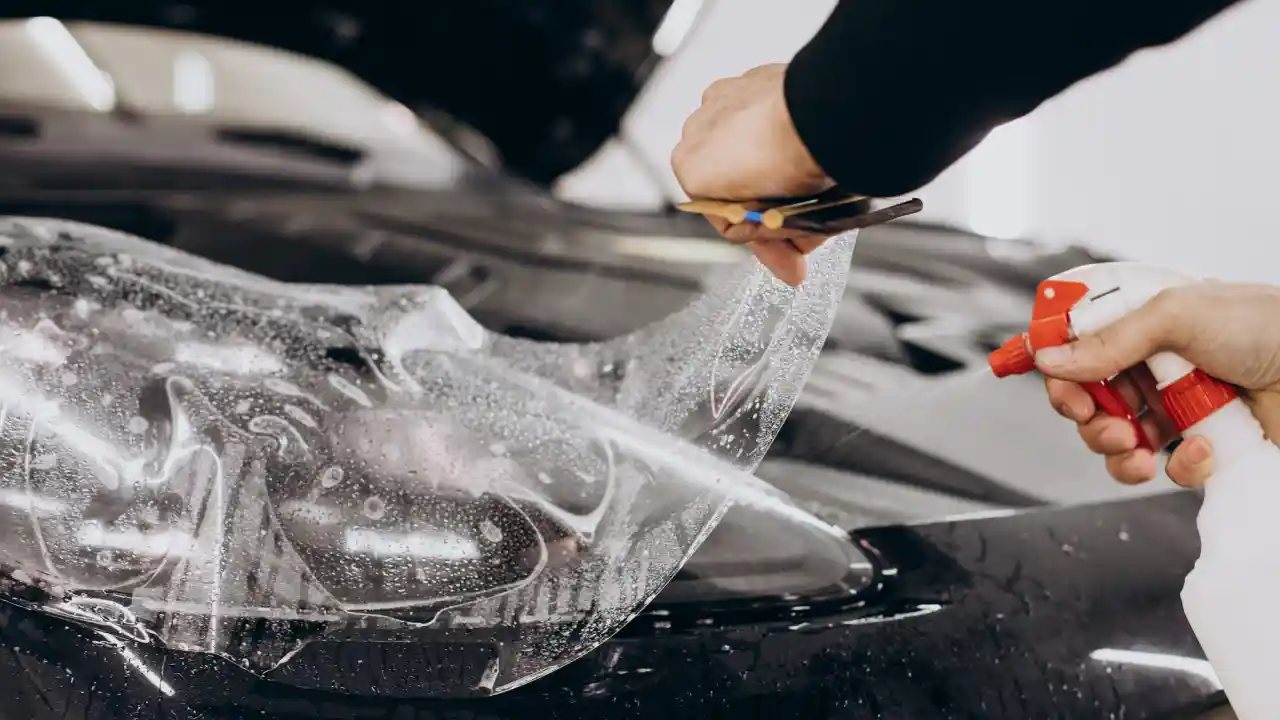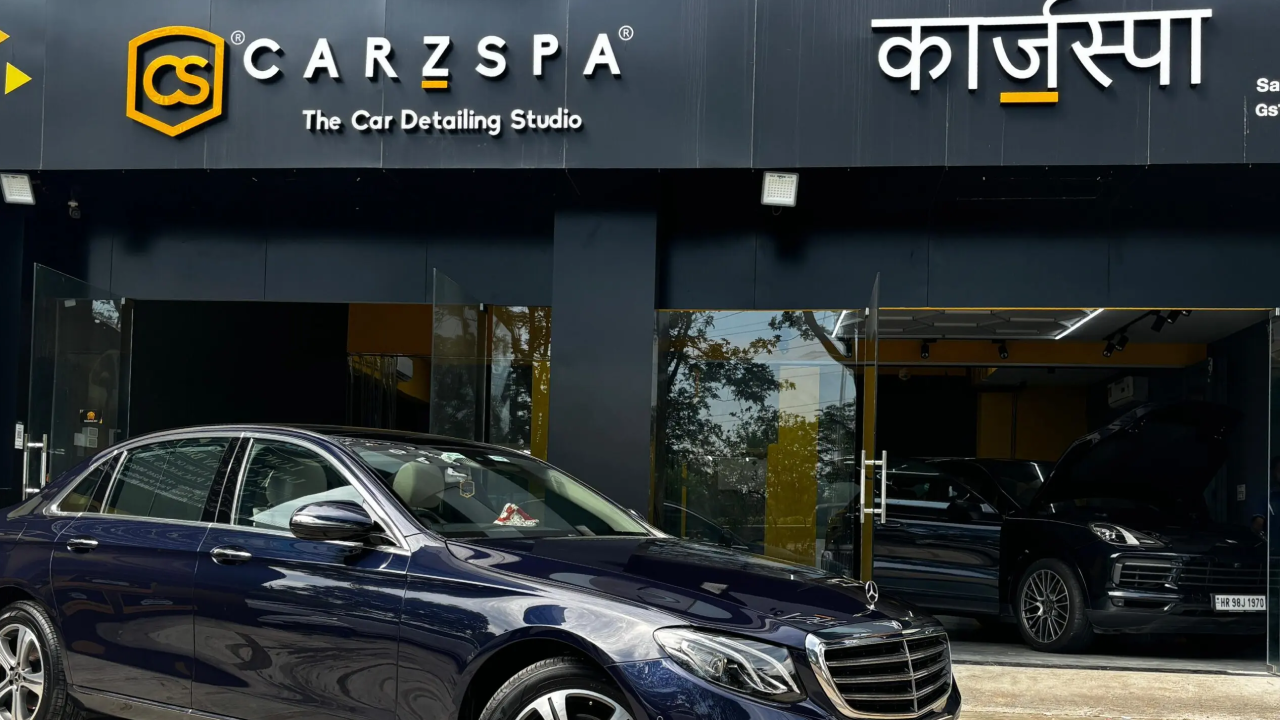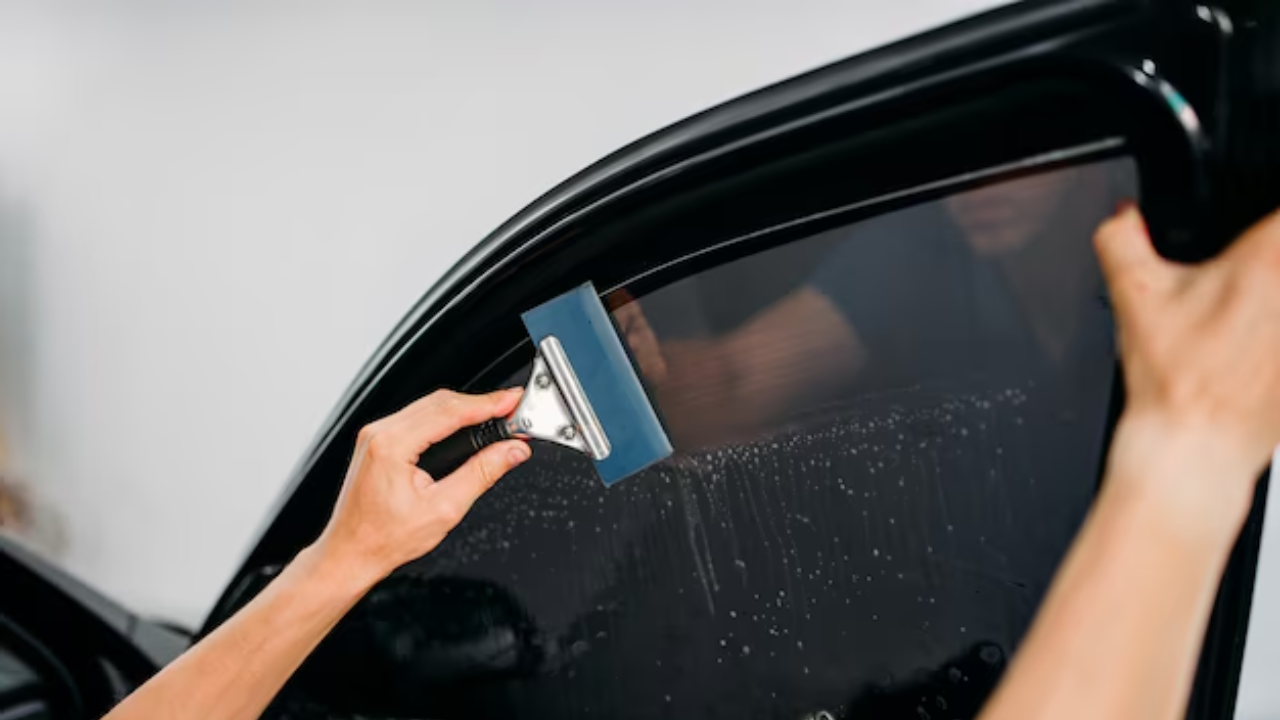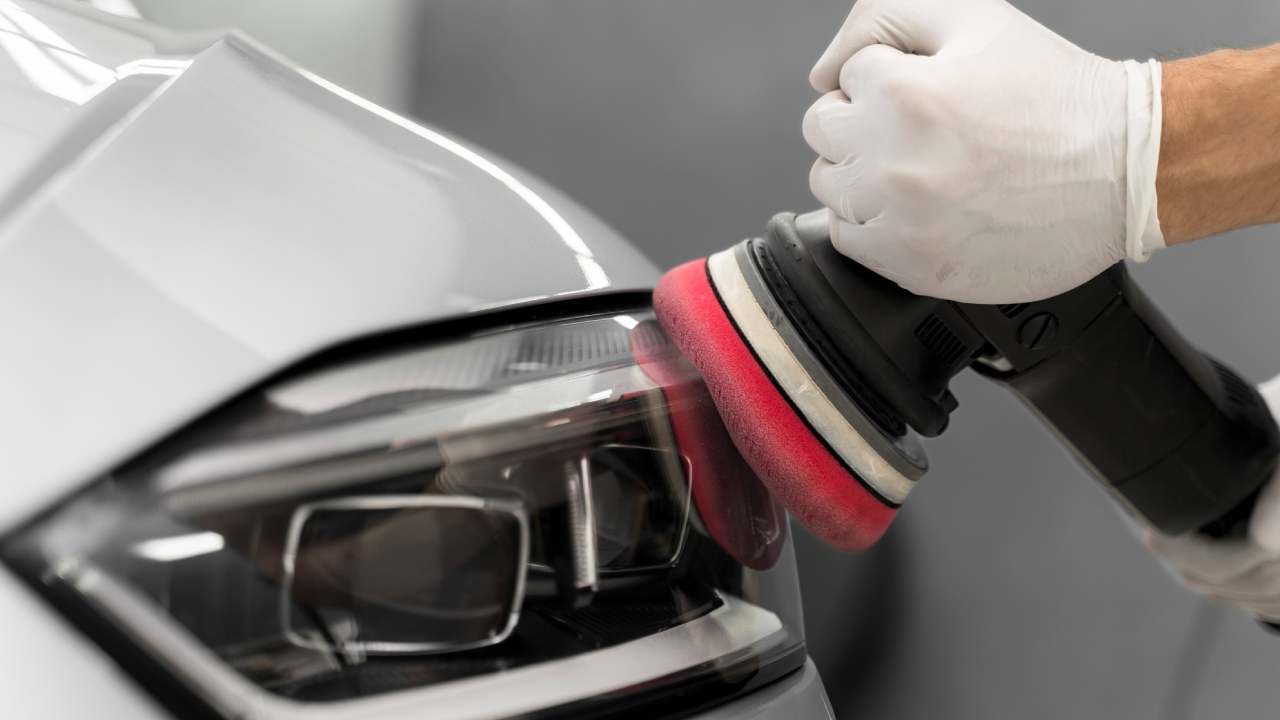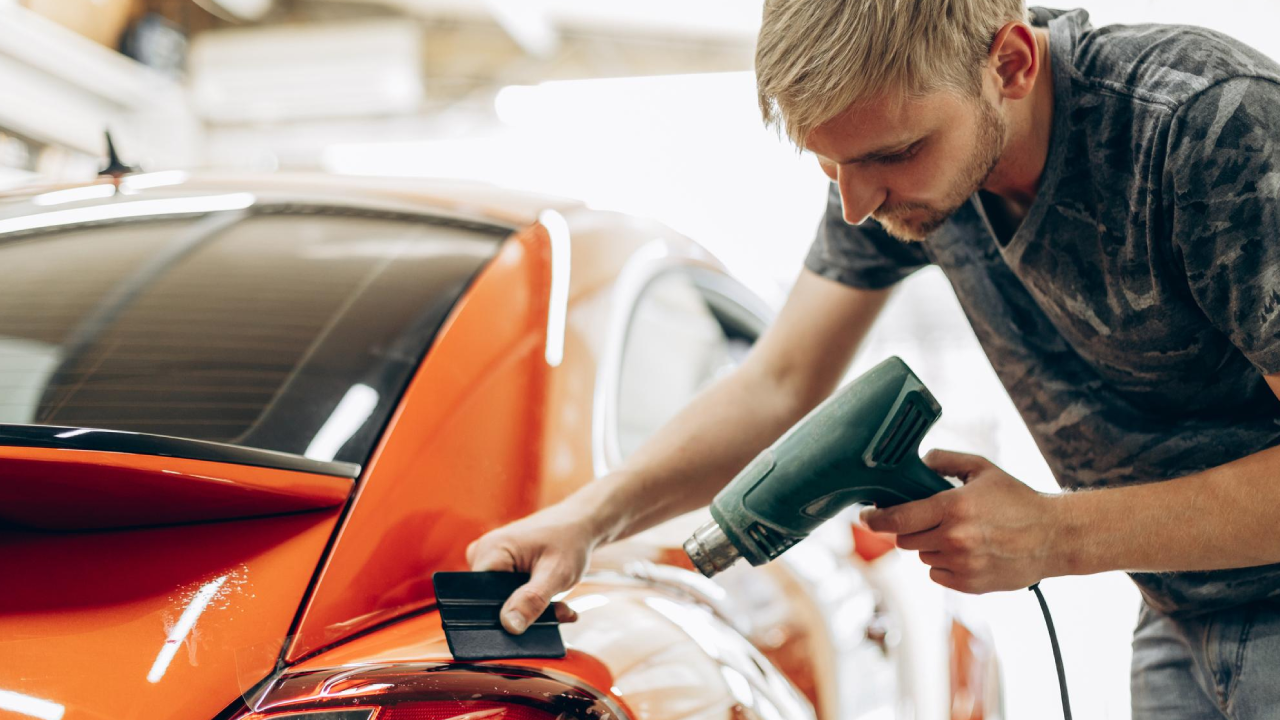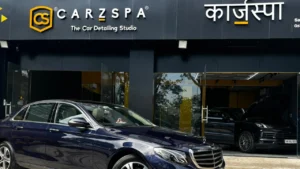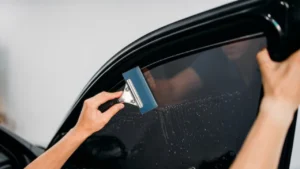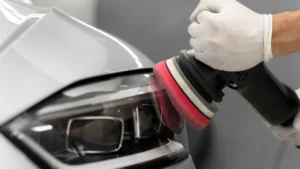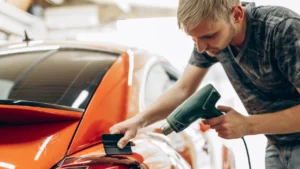Cars, much like their owners, endure a lot. From rock chips and scratches to bug splatters and minor abrasions, the exterior of a car is constantly battling external elements. Despite these challenges, every car owner dreams of maintaining that showroom shine, making their car look brand new every day. But is it possible? Is there a solution that can protect your car’s paint from these everyday damages? The answer is yes, and it’s called Paint Protection Film (PPF).
PPF is a self-healing film applied to the painted surfaces of a new or used car. Its primary function is to shield the paint from the harsh realities of outdoor driving and keep your car looking as good as new. In this blog, we will explore how PPF works, its benefits, how to maintain it, and how durable it is.
Table of contents
What is a Paint Protection Film
Paint Protection Film in India (PPF), is a thermoplastic polyurethane film applied to the painted surfaces of a car to protect the paint from stone chips, bug splatters and minor abrasions. It’s like a special shield, a self-sacrificial layer of armour that takes the hits so your car’s paint doesn’t have to.
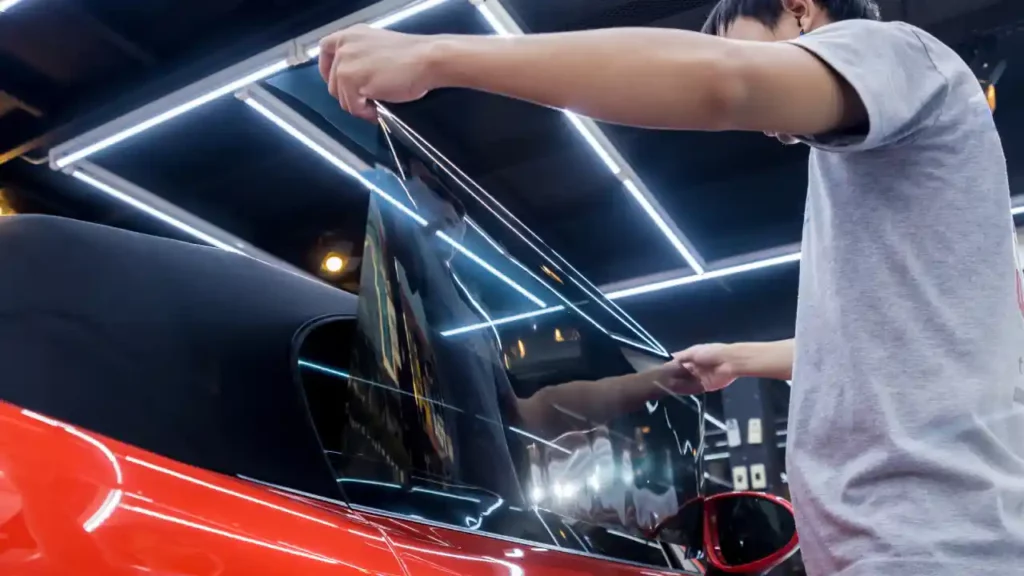
The origins of PPF are quite fascinating. It was first developed and used by the US military during the Vietnam War to protect helicopter rotor blades and other sensitive parts of military transports from damage. The automobile industry began to take note of the protective benefits of PPF and it wasn’t long before race car drivers started employing it. As more and more car owners in India learn about the benefits of car paint protection and reasonable PPF coating prices, they are choosing to invest in this service for their vehicles.
How does paint protection film work?
When you drive your car regularly and occasions take it on long-distance trips, it gets exposed to scratches, rock chips and fading. Now you might be wondering: In such scenarios, does paint protection film work? The answer is yes and the science behind it is quite fascinating. Paint Protection Film (PPF) is primarily composed of thermoplastic polyurethane, a type of plastic renowned for its exceptional resistance to impacts, abrasions and corrosion. This material is what gives PPF its self-healing properties, meaning that minor scratches can disappear with heat or time.
A sheet of PPF consists of multiple layers, each serving a specific purpose. The top layer is typically a clear coat that provides a glossy finish and contains self-healing properties. The middle layer is the actual urethane film that absorbs impacts and the bottom layer is an adhesive that bonds the film to the car’s paint.
The layers in PPF are specifically engineered to absorb the impact of objects hitting the film, leaving the paint job unscathed. When an object hits the film, the impact is distributed across a larger area, reducing the likelihood of damage.
PPF creates a barrier between the car’s paint and the outside world. It protects against a variety of potential damages including stone chips, bug splatters, bird droppings and minor abrasions. So, does paint protection film really work? The answer is a resounding yes, as PPF can preserve the original look and quality of your car’s paint for years.
Benefits of Paint Protection Film (PPF)
The benefits of using a Paint Protection Film are numerous, making it a worthwhile investment for any car owner. Here are some key advantages:
- Impact Protection: ne of the primary benefits of PPF is its ability to absorb impact from small rocks, gravel, tree branches and other hard objects. This prevents them from hitting the paint surface directly and causing chips or scratches.
- Resistance to Acidic Corrosion and Contaminants: PPF is resistant to acidic contaminants and corrosion. This means it can protect your car’s paint from bird droppings, bug splatters and acid rain, all of which can cause damage to the paint if left untreated.
- Protection Against Mineral Deposits and Water Spots: Hard water spots and mineral deposits can leave unsightly marks on your car’s paint. PPF acts as a barrier, preventing these deposits from coming into direct contact with the paint.
- Reduction of Oxidation: PPF helps reduce oxidation on factory paint caused by UV light. This means your car’s paint will look newer for longer, even when exposed to harsh sunlight.
- Enhanced Finish: PPF application on your car’s exterior surface enhances the existing paint’s outlook. It instantly creates a brilliant and customised exterior look and appeal. PPF also comes in different colours and finishes, such as matte, glossy, metallic and pearl, giving you more options to personalise your car.
- Self-Healing Properties: PPF can heal itself from minor scratches and scuffs. This is because it is made of thermoplastic polyurethane, which can soften and become pliable when heated. These minor abrasions can go away with heat application, restoring the PPF to its original state.
- Ease of Repairability: If there is major damage to your car’s paint, PPF can be easily removed and replaced by a professional detailer. You won’t have to worry about repainting the whole car part, as PPF can be applied to specific areas of your car.
- Preservation of Resale Value: PPF helps preserve the resale value of your car by keeping the paint in pristine condition. Buyers are more likely to pay a higher price for a car that looks new and well-maintained. PPF can also be removed without leaving any residue or damage to the paint, making it easier to sell your car.
Considering these benefits, it certainly seems investing in PPF coating is worth it. Not only does it protect your car’s paint from a variety of damages, but it also helps maintain its aesthetic appeal over time. If you are looking for the best paint protection film in India, you can check out Aegis Eternal 300, which is the thickest Paint Protection Film to be ever introduced. And CarzSpa’s team of trained and experienced detailers will install this PPF on your car with precision and care.
Types of PPF
There are several types of Paint Protection Film (PPF) available in the market, each with its unique properties and benefits. PPFs are primarily made of materials like Thermoplastic Urethane (also known as TPU), TPH and Polyvinyl Chloride (also known as PVC).
TPU films are known for their durability and self-healing properties. They can repair themselves from minor scratches and swirl marks when exposed to heat, making them a popular choice for car owners who want to preserve their car’s appearance. TPH films are appreciated for their high clarity and gloss. They provide a high-gloss finish that enhances the look of your car’s paint, making it look as good as new. TPH films are also a budget-friendly option, as PVC films have been practically discontinued for paint protection films. PVC films offered less protection and faded over time. Therefore, most car owners prefer either TPU or TPH films for their car’s paint protection.
There are 3 types of PPFs available for different requirements.
- Gloss PPF: This type of PPF is designed to give your car a shiny, glossy finish. It enhances the colour depth of your car’s paint, giving it a vibrant look. The high-gloss finish also makes your car look like it just rolled out of the showroom, adding to its aesthetic appeal.
- Matte PPF: Matte PPF gives your car a sleek, modern look with its non-reflective finish. It’s perfect for those who prefer a more understated aesthetic. Despite its matte finish, it still offers excellent protection against scratches and chips.
- Coloured PPF: Coloured PPF allows you to change the colour of your car without repainting it. It offers the same protective benefits as other PPFs while giving your car a whole new look. You can choose from a wide range of colours, allowing you to customise your car’s appearance to suit your style.
Choosing the right type of paint protection film depends on your specific needs and preferences. Whether you’re looking for high gloss, a matte finish, or a specific colour, there’s a PPF out there that’s perfect for you.
Maintenance and Durability of Paint Protection Film
How long does paint protection film last?
The longevity of a paint protection film (PPF) largely depends on the quality of the film and how well it’s maintained. High-quality PPFs can last anywhere from 5 to 10 years, making them a long-term investment for your car paint protection. However, this durability is also influenced by factors such as climate, driving habits and exposure to contaminants.
How to maintain a car paint protection film?
Maintaining a PPF-coated vehicle is relatively straightforward. Regular washing will keep the film looking its best. It’s also important to remove any acidic contaminants (like bird droppings or bug splatters) as soon as possible to prevent them from staining the film. For minor scratches, heat from the sun or an engine can often cause the film to self-heal, but for deeper scratches, professional repair may be necessary. To keep the film in optimal condition, it is recommended to get a special PPF Decon wash every few months at CarzSpa stores, which can remove oxidation and pollution from the surface of the film. This will help preserve the gloss and clarity of the PPF and extend its lifespan.
Factors that can affect the lifespan of PPF
Some of the factors that can affect the lifespan of PPF are:
- Climate: Extreme temperatures, humidity and UV rays can cause the film to degrade over time. PPFs with UV inhibitors can help reduce this effect, but they are not immune to it.
- Driving Habits: Frequent driving on rough roads, gravel or dirt can increase the chances of the film getting chipped or scratched by debris. PPFs with high impact resistance can help protect the film from these damages, but they are not invincible.
- Exposure to Contaminants: Acidic substances, such as bird droppings, bug splatters and acid rain, can damage the film if left untreated. PPFs with stain resistance can help prevent this, but they still need to be cleaned regularly.
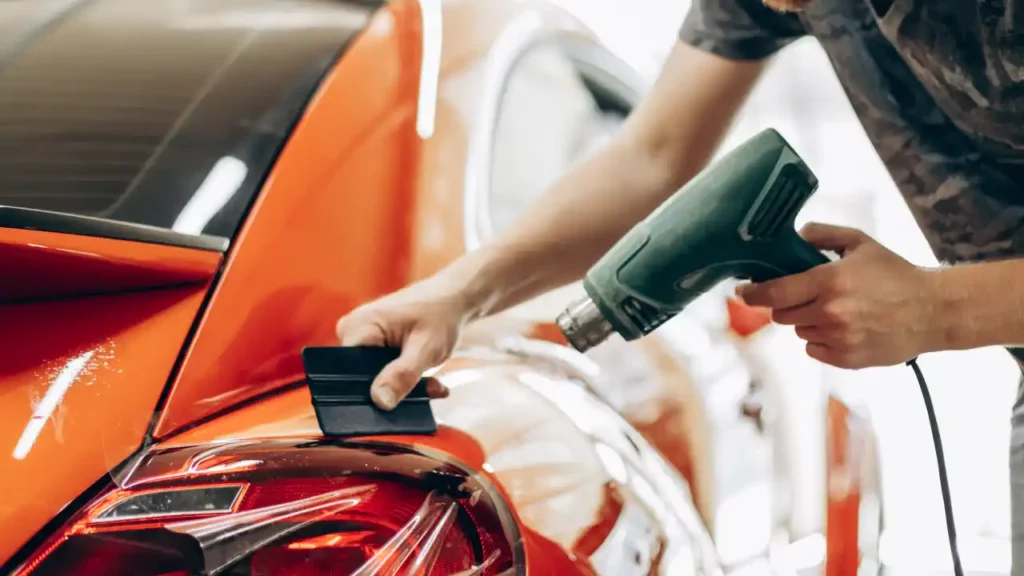
CarzSpa offers a pan-India warranty on Aegis PPF. Its best paint protection film in India, the Aegis Eternal 300 comes with a lifetime warranty. Customers can check and verify their warranty online on the CarzSpa website, ensuring transparency and trust in the service provided.
So, is PPF coating worth it?
If you love your car and want to keep it looking as good as new, you must consider paint protection with PPF. If you’re thinking is PPF coating worth it, then yes it is! It prevents scratches, chips, and scuffs from road debris, rocks, insects, and other hazards, enhances the gloss and shine of your car’s paint and has self-healing properties that can repair minor abrasions with heat or water. It also resists stains and discolouration from UV rays, limescale and resins. PPF coating is a worthwhile investment for car owners who want to protect their vehicles from damage and maintain their aesthetic appeal. PPF coating can last up to 10 years or more with proper care and maintenance. PPF coating is the best choice for car paint protection.
To conclude…
Paint Protection Film is a long-lasting solution that protects your car’s paint from a variety of damages, from stone chips and scratches to acidic contaminants and UV light. Given its protective properties and the value it adds to your vehicle, getting PPF coating is worth it.
However, it’s important to remember that installing PPF is not a DIY job. It requires expert detailers and car care professionals to ensure the film is applied perfectly. Don’t fall for claims that PPF can be installed on your own. Trust professionals like CarzSpa Detailing Studios who have the expertise and experience to install the PPF to perfection.
So why wait? Give your car the protection it deserves. Get PPF on your car from the nearest CarzSpa Detailing Studio in your city today.
Frequently Asked Questions
1. Is paint protection film a good idea?
Paint protection film is a good idea if you want to protect your car’s paint from damage and fading. Paint protection film can prevent scratches, chips, stains and corrosion caused by road debris, insects, chemicals and UV rays. Paint protection film also enhances the appearance and value of your car.
2. Does PPF make paint look better?
PPF can make paint look better by enhancing the appearance and value of your car. PPF can also prevent the paint from fading and discolouration due to UV rays and chemicals. PPF can also give your car a glossy or matte finish, depending on your preference. PPF can also help your paint self-heal from minor scratches with heat. Therefore, PPF can improve the quality and beauty of your car paint.
3. Do you really need paint protection film?
You may need paint protection film if you want to keep your car’s paint in pristine condition and avoid costly repairs. Paint protection film can protect your car from various forms of damage, such as scratches, chips, stains, corrosion and fading caused by road debris, insects, chemicals and UV rays. Paint protection film can also enhance the appearance and value of your car by giving it a glossy or matte finish and self-healing minor scratches with heat. Paint protection film is a worthwhile investment for car owners who care about their vehicle’s look and performance.

